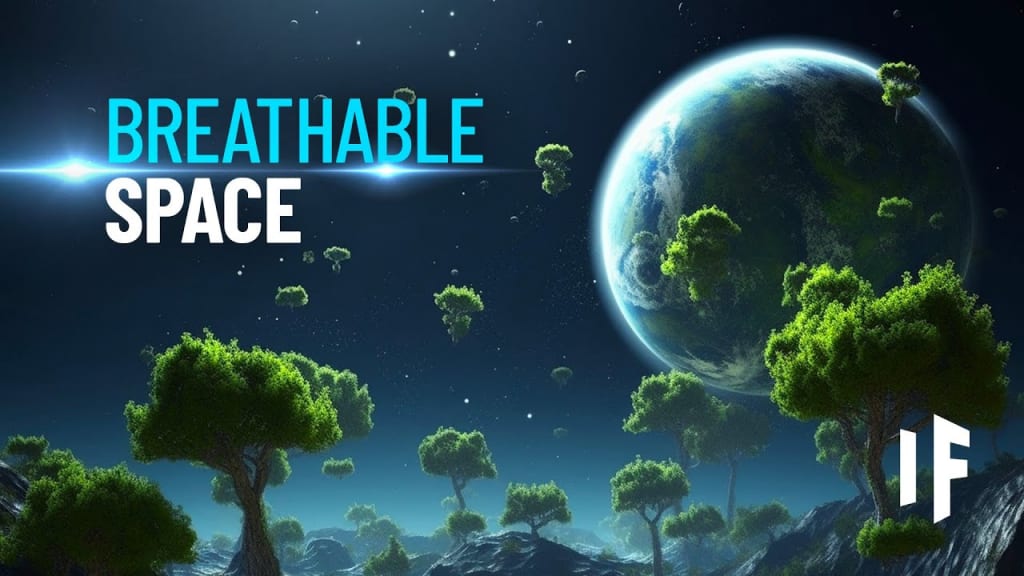WHAT IF OUTER SPACE WAS BREATHABLE
Outer space with breathable air

What If Outer Space Was Breathable?
Imagine a scenario where outer space is filled with breathable air. Instead of suffocating in the vacuum, astronauts would experience fresh cosmic air. In this edition of "What If," we explore the potential consequences of such a transformative change.
Currently, Earth's atmosphere consists of 78% nitrogen, 21% oxygen, and trace amounts of other gases, with molecular oxygen being crucial for supporting life. However, beyond the 10,000 km (6,200 mi) that the atmosphere extends above the Earth's surface, oxygen atoms in space bind with space dust and react with hydrogen atoms, forming water ice instead of molecular oxygen. But let's envision a scenario where breathable air extends all the way to the edges of the heliosphere, which marks the boundary where the Sun's gravity weakens compared to other stars. Would this expansive atmosphere enable humans to travel anywhere in space and breathe as they do on Earth?
Before delving further, let's take a moment to address the aesthetic aspect. If we were to embark on spacewalks in this breathable universe, our spacesuits would likely undergo a significant makeover to align with the newfound conditions.
In addition to the surprising breath of fresh air, several significant changes would occur. One intriguing transformation would be the ability to hear the Sun and other planets. In the vacuum of space, sound cannot travel due to the scarcity of molecules required to carry sound waves. However, in a universe filled with air, sound waves could propagate over vast distances, enabling us to perceive the symphony of celestial bodies. The Sun, vibrating constantly at various frequencies, would emit deafening noise, reaching our ears at a volume of 125 dB, despite the considerable distance between the Sun and Earth's surface. Picture going about your daily routine accompanied by a soundtrack akin to thousands of blaring police sirens or the resounding chimes of a grand cathedral. Undeniably annoying, but not our most pressing concern.
The absence of friction in the vacuum of space allows planets and moons to orbit the Sun without losing speed. However, in a universe filled with air, planets would collide with air particles at high velocities. Earth, with its current orbital velocity of 30 km/s (18.6 mi/s), would experience the same fate as asteroids entering our atmosphere: intense friction causing them to heat up and burn. Consequently, our planet's surface would be left scorched, in a state of irreversible damage. But the chaos would not end there.
Eventually, the Moon's motion would slow to a halt due to air resistance. Earth's gravity would then pull the Moon closer, leading to a catastrophic collision. Survivors from the scorched Earth would witness the destruction of the entire planet as it tears apart under the impact. Unfortunately, the rest of the Solar System would not fare any better.
With copious amounts of air present, our Solar System could potentially collapse into a black hole. The mass of the air would contribute to this transformation, and considering that the radius of the heliosphere spans 90 astronomical units (AU), the resulting mass would be approximately five billion times greater than that of the Sun. As the mass compresses under the Sun's gravitational pull, the Solar System would become increasingly dense. If all the air compressed into a space roughly 80% of the Earth's diameter, a black hole would form—a gravitational behemoth that would be over 1,200 times more massive than the supermassive black hole residing in the center of the Milky Way galaxy. At this point, however, the survival of any remaining life forms would be highly improbable.
In conclusion, the hypothetical scenario of outer space being filled with breathable air yields fascinating possibilities but also dire consequences. While breathing fresh cosmic air might seem enticing, the repercussions of such an alteration would lead to the scorching of Earth's surface, the catastrophic collision of the Moon with our planet, and the potential transformation of our Solar System into a black hole. Perhaps it is best to appreciate the vastness and uniqueness of space from the safety and comfort of Earth's protective atmosphere.
And that concludes this edition of "What If?" Stay tuned for more captivating explorations into the realm of the unknown.
About the Creator
its_me_rania
I am a valuable contributor to Vocals.Media.With a deep passion for article writing, i brings a unique perspective to every content i create.I have a talent for crafting well-researched and thought-provoking articles.






Comments (1)
I That what if could have been more helpful considering that population of the world increases day by day.